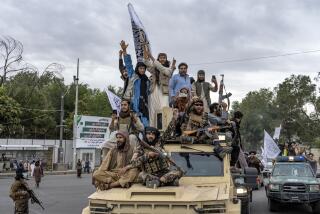Afghan enforcement of liquor ban rankles foreigners
- Share via
Reporting from Kabul, Afghanistan — The timing might be entirely coincidental, but the liquor taps of Kabul are running dry — on the heels of a bitter public quarrel between Afghan President Hamid Karzai and his Western backers.
Alcohol is illegal in what is formally known as the Islamic Republic of Afghanistan. But in the nearly nine years since the fall of the Taliban, a number of restaurants with a mainly foreign clientele have enjoyed a de facto exemption from the ban, as long as they refrain from serving liquor to Afghan Muslims.
Behind high blast walls and double-doored entryways, where patrons are sometimes asked to show their foreign passports, the libations flowed freely — at least, until lately. In the wake of police raids on several establishments this month, a Prohibition-style sensibility has set in.
At some restaurants frequented by diplomats, aid workers and other foreigners, liquor is now served clandestinely, out of juice containers or from porcelain teacups, in back rooms or at secluded tables. Even the best-connected restaurateurs are fearful of police bursting in and dragging them, their wait staff or even patrons off to jail.
In the dinner-hour raids this month, gun-toting Afghan police confiscated tens of thousands of dollars worth of wine and spirits. At one eatery close to the U.S. Embassy, half a dozen foreign waitresses, mainly from the former Soviet Union, were detained and accused of prostitution.
It’s a far cry from Taliban times, but some find the crackdown unpleasantly reminiscent of the movement’s harsh rule, when women were forced to stay home, music and television were banned and roaming vice squads meted out beatings and other punishment to those deemed to be engaging in immoral behavior.
Still, few Afghans can muster much sympathy for thirsty foreigners, whose privileged existence rankles many here.
Restaurants, hotels and other establishments catering to Westerners form a kind of parallel economy with little relation to what lies within the financial reach of the vast majority of this country’s citizens. Dinner in such restaurants can cost more than a month’s salary for many Afghans.
It’s not clear who initiated the raids. The Interior Ministry, which would normally have authority in such matters, said it was a decision made by the local police. But the scale of the crackdown — which includes newly initiated announcements on incoming international flights warning against the importation of alcohol — appears beyond the scope of police authority.
The Karzai government of late has had rocky relations with the West. The Afghan leader rattled his foreign allies this month by blaming the West for the massive fraud that tainted the presidential election last August.
After the White House characterized his comments as “disturbing,” Karzai responded by declaring — perhaps rhetorically — that foreign meddling might just drive him join the Taliban.
Karzai’s aides were particularly incensed when former U.S. diplomat Peter Galbraith, who was fired last year as the No. 2 official at the U.N. mission in Afghanistan, hinted that the Afghan leader’s sometimes-erratic behavior might be due to a drug habit.
Both sides have worked since then to smooth things over. Senior Obama administration officials issued public assurances of partnership, and Karzai is to visit the White House in May, a meeting that had appeared in jeopardy at the height of the public squabble.
In the meantime, many expatriates wonder whether this is payback time — a means for the Karzai administration to quietly needle Westerners without stirring up a diplomatic hornet’s nest.
“It’s a way of showing who’s in charge here,” said a European aid worker, nursing a beer he had managed to wheedle from a well-tipped waiter.
In any event, the ban is far from watertight. Diplomats have ready access to supplies of liquor — and, perhaps for that reason, invites to embassy receptions are rarely declined these days. Other foreigners resort to buying from local bootleggers who charge extortionate prices.
In past years, such crackdowns have been short-lived. But this time, restaurant owners and their expatriate customers are settling in for what could be a long dry spell.
“It’s the law,” said Gen. Abdul Ghafar, the chief of detectives for the Kabul police, whose forces have been carrying out the raids. “And it’s for Allah’s sake.”
More to Read
Sign up for Essential California
The most important California stories and recommendations in your inbox every morning.
You may occasionally receive promotional content from the Los Angeles Times.










